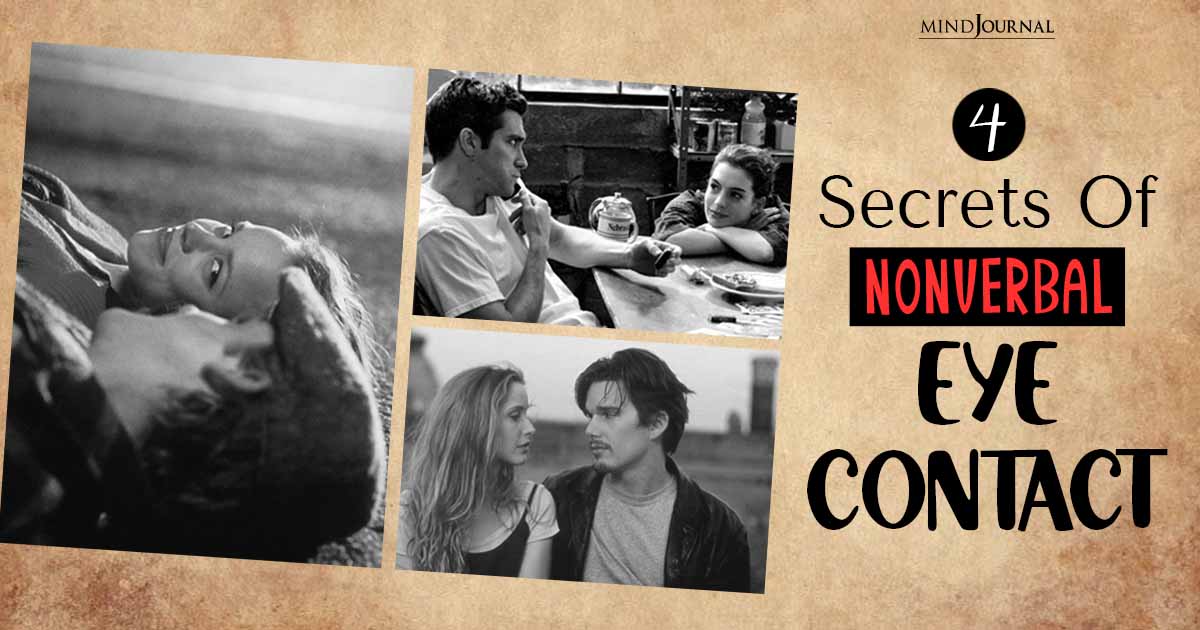When it comes to body language cues, nonverbal eye contact is as crucial as facial expressions and body movements. This article is going to talk about the secrets and importance of nonverbal eye contact.
KEY POINTS
- Research on nonverbal communication shows the eyes are a complex and important communication channel.
- Our eyes play an important part in communicating emotions through facial expressions.
- The eyes may indicate sexual interest and the depth of love and attraction.
When we think of body language — nonverbal communication — we immediately focus on facial expressions, gestures, and body movements as communication cues.
The movement of the eyes and how we use them are often overlooked, but they are an important means of communication. Here are some findings.
Related: 5 Ways Non-Verbal Skills Can Help You Build A Strong Personal Brand
4 Secrets of Nonverbal Eye Contact
1. The Eyes Are a Critical Component of Facial Expressions.
Although we may search for a smile or a frown as a body language cue, our eyes and their complex musculature play an important part in the accurate facial expression of emotions.
For example, research by psychologist Paul Ekman shows that our eyes are a tell-tale sign of when we are experiencing true happiness, or faking it. The “Duchenne smile,” according to Ekman (Ekman, et al., 1990), is when the eyes narrow and create the lines, or “crow’s feet,” at the outer corners.
This is the smile of real, experienced positive affect. If these critical ocular cues are missing, it’s likely that the smile is fake.

2. The Eyes Are a Source of Arousal.
Mutual eye contact — staring directly into someone else’s eyes — immediately triggers arousal. That arousal is then interpreted based on who the other person is and the circumstances.
If the other person is a suspicious-looking stranger, it may trigger fear. Or, if we feel threatened by the other person, the stare may cause us to feel irritated and angry.
3. The Eyes Can Indicate Sexual Interest.
Speaking of arousal caused by mutual gaze, looking directly into someone’s eyes, and holding that mutual eye contact for a bit longer than what is normal, can indicate flirtation and sexual interest.
Another eye cue, but one that goes largely unnoticed, is pupil dilation. When we are really interested in something or someone, it causes our pupils to widen as we focus in on the object of interest.
If that person is an interesting and sexy potential partner, our pupils can dilate (although it is unclear if the other person will or will not notice it and be affected by it).
There is also research that shows that mutual gazing into another’s eyes can be a valid indicator of love. Couples in love tend to do this, and the more they do it, the deeper the love and attraction.
Related: Everything You Need To Know About The Power of Eye Contact
4. The Eyes Can Be Used to Deceive Others.
Our own research on deception (Riggio & Friedman, 1983) uncovered an interesting finding: Although it is commonly believed that a liar can’t look you in the eye, our results suggested the opposite.
When people were asked to either tell the truth or lie, the liars tended to engage in MORE eye contact than when they were telling the truth.
Why? Because they likely knew the common stereotype about deception, and they overcompensated with their eyes when lying.
References:
Ekman, P., Davidson, R. J., & Friesen, W. V. (1990). The Duchenne smile: Emotional expression and brain physiology: II. Journal of personality and social psychology, 58(2), 342.
Rieger, Gerulf, and Ritch C. Savin-Williams. "The eyes have it: Sex and sexual orientation differences in pupil dilation patterns." PloS one 7, no. 8 (2012): e40256.
Riggio, R. E., & Friedman, H. S. (1983). Individual differences and cues to deception. Journal of personality and Social Psychology, 45(4), 899.
Written by Ronald Riggio
Originally Appeared On Psychology Today










Leave a Reply